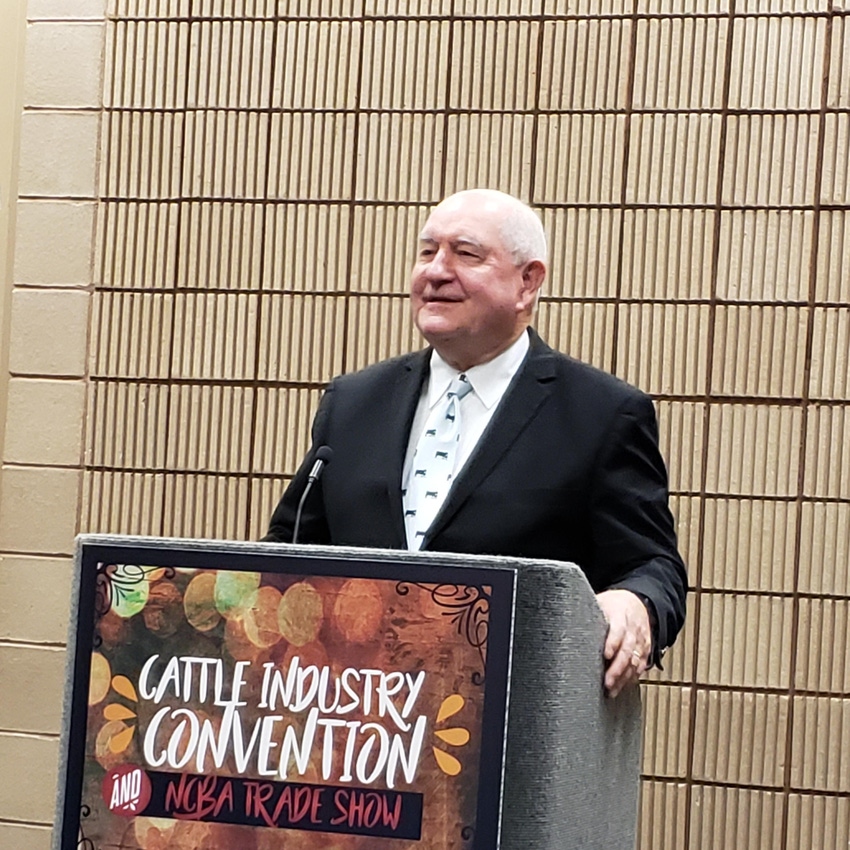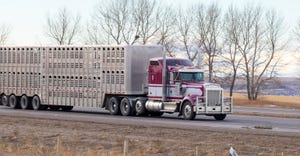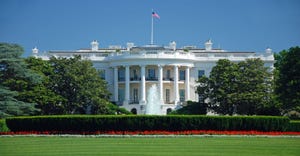The three most important things to U.S. farmers and ranchers are trade, trade and trade, U.S. Agriculture Secretary Sonny Perdue said during his address at Cattle Industry Convention in New Orleans.

Differences still exist between the U.S. and China on the trade front, but progress may well be in the works, U.S. Agriculture Secretary Sonny Perdue said when speaking Feb. 1 at the Cattle Industry Convention in New Orleans, La.
Indications from the recent meeting with China in Washington, D.C., were that there is a general desire to get something done. Still, Perdue said, that doesn’t mean it is done. “It is never done until it’s really done, and then it’s really never done until enforcement is in place,” he said, noting that some of the core issues that President Donald Trump is particularly concerned about are related to intellectual property transfer and international property theft. "We want customers that play by the rules.”
According to Perdue, Trump is interested in the long-term sustainability of any agreement that is signed. “Trump is not going to sign something just to have a deal and that does not have any teeth in it to enforce.”
Plans are for a U.S. delegation to go back to China later this month and for Trump and China's President Xi Jinping to meet again sometime after that.
The U.S. would love to see trade and relations with China restored. “We would love for them to be a reliable customer. We know that we can be a reliable supplier,” Perdue said.
In a Jan. 31 press conference with China's Vice Premier Liu He, who led the talks for China, Trump touted that China had agreed to buy 5 million metric tons of U.S. soybeans. Liu noted that the purchases would be per day, but the White House later clarified that it was just a total of 5 mmt.
The Xinhua News Agency said a statement from the Chinese delegation indicated that the discussions made "important progress" given the current stage of the talks and the two sides had "candid, specific and fruitful" discussions. It was reported that China will "substantially" expand imports of agricultural, energy and industrial products, but there was no indication of any tonnage or dollar amounts involved. Reports from the Trump camp are that the extra buys will include corn and wheat, along with other products.
U.S. Trade Representative Robert Lighthizer told reporters, "At this point, it's impossible for me to predict success, but we are in a place where, if things work out, we could have that. We did make progress on a variety of key issues. I am not going to explain what the key issues are, and there is a lot more to be done."
As for other areas in the talks, the White House indicated that the discussions focused on China strengthening its intellectual property protections, reducing its "numerous tariff and non-tariff barriers" and stopping cybertheft of U.S. commercial property.
The White House has indicated that both sides expect that any eventual deal will be "fully enforceable."
Perdue also noted to cattle producers gathered in New Orleans that the U.S. is busy traveling the world seeking to open new markets for U.S. agricultural products. The U.S. has great products and plenty of them. The situation is that we’ve become too dependent on certain countries/customers, and we need to spread that out, he said. Among the list of countries Perdue rattled off were Morocco, Thailand, Vietnam, Africa, Asia, Malaysia, India and more. “Anyone that eats is in our sights,” he said.
Japan is another important market for U.S. agriculture, Perdue said. “Obviously, we are very aware of the importance of Japan to the beef market and agriculture as a whole, and we are working very diligently in Japan-U.S. trade relationships," he said.
Likewise, the European Union is another focus area for U.S. trade negotiators. The U.S. is not open to a deal with the EU that does not include U.S. agriculture, Perdue said. The EU probably has more non-trade barriers for U.S. agriculture than anywhere globally, and the U.S. is insistent that the EU remove those trade barriers and deal based on internationally recognized phytosanitary/sanitary standards rather than putting its own spin on quality issues, Perdue said.
Perdue referenced the recent allocations of $200 million under the Agricultural Trade Promotion Program to help U.S. agricultural exporters develop new markets and help mitigate the adverse effects of other countries’ tariff and non-tariff barriers. In total, he said assistance was handed out to 57 different groups for a three-year period. “We need collaboration to build world markets,” Perdue said. At the same time, he noted that he wants a return on this investment.
Finally, Perdue challenged cattle producers to “really” get to know their customers locally and globally. He said the beef industry cannot sit back and expect the retail sector to correct the misinformation that exists when it comes to its product and how it raised. “As an industry, you have nothing to be ashamed about,” Perdue said.
About the Author(s)
You May Also Like



